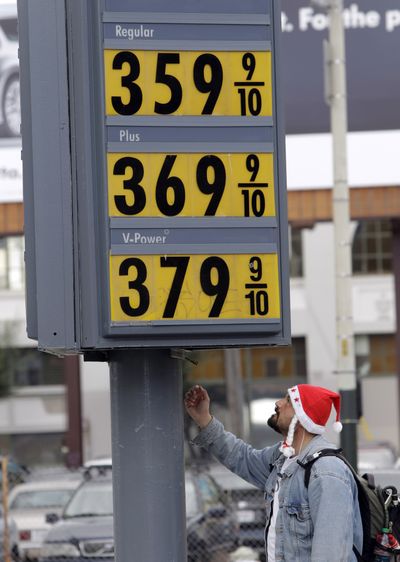Higher fuel prices could stall recovery

CHARLOTTE, N.C. – For the first time in two years, the average gas price is higher than $3 a gallon, sucking money from drivers’ wallets and, experts worry, possibly hampering the economy’s rebound.
The national average price for a gallon of regular, unleaded gasoline was $3.07 on Thursday, according to AAA’s Fuel Gauge Report, the highest since October 2008.
That’s 42 cents higher than a year ago, and prices aren’t likely to improve significantly anytime soon. Experts offered differing predictions as to how high gas could go, with at least one saying prices could hit $5 a gallon by the end of 2012.
“Outrageous,” said Joe Tate, putting gas in his Buick at a Shell station in Charlotte. “It makes my head hurt.”
Tate, a self-employed auto mechanic, put only 1 gallon of regular gasoline in the car at a cost of $3.06. He thought last year’s gas prices of about $2.50 a gallon were reasonable.
“I can handle that,” Tate said. When asked what he would do if gas prices keep rising, Tate shook his head.
“I’ll be walking or taking the bus,” he said.
Tate has it easier than drivers on the West Coast, where gas prices topped $3.55 at some stations in San Francisco on Wednesday.
“We’re going to have a more expensive start to 2011, for sure,” said Tom Crosby, a spokesman for AAA Carolinas. “We expect prices to continue to be high and hover around $3 a gallon.”
Several factors are behind the surging gas prices, which experts said are unusual for this time of year. The recent cold snap in the U.S. and Europe created more demand for heating oil, which lowers production of gasoline and raises its price.
Oil is also trading above $90 a barrel for the first time since 2008, which experts say is driven by increased demand, a stagnant supply and speculative trading. The weak dollar and an explosion of new automobiles in Asia are also behind the rise.
Rising fuel costs will hurt consumers’ disposable income and could dampen a strong economic recovery next year, said retail consultant Britt Beemer, CEO of America’s Research Group.
“You’ll be saying, ‘Last year, I filled up my tank for $40. This year it’s costing $60,’ “ Beemer said. “You really notice that $20. Gas prices are really going to have an impact.”
And even if Americans don’t drive, they’re likely to see higher fuel costs in other places. Pricier gasoline could drive up the cost of groceries and other consumer goods – which are universally delivered by truck – and US Airways is joining some other domestic carriers in adding a $20 round-trip surcharge to help with rising costs.
Purely discretionary purchases that consumers will be able to eliminate quickly will be hit the hardest this year, Beemer said.
“The first thing they’ll cut out is they’ll go to fewer movies,” he said. “The second thing they’ll cut out is eating out at restaurants.”
Some experts think that we’re in for higher-than-ever prices over the coming years.
John Hofmeister, former president of Shell Oil, has predicted that gas will top $5 a gallon by the end of 2012 as supplies fail to keep up with increasing demand. He heads Citizens for Affordable Energy, a group that advocates for increased domestic energy production from all sources.
Over the next year, prices likely won’t go too much higher than $3 a gallon, though, said James Williams, an oil and energy analyst at Arkansas-based WTRG Economics.
“The Saudis don’t really see it in their best interest for oil to hit $100 a barrel,” Williams said. “That would probably add another 25 cents a gallon to it. That could easily push us into another recession.”
The last time oil prices surged above $100 a barrel, in 2008, the world economy crashed and oil prices tumbled from $145 a barrel to mid-$40s a barrel in less than a year, Williams said.
He predicts oil-producing countries will try to increase supply to keep prices under $100 a barrel, to protect themselves from another price crash.
“Every time you see a recession, you see a collapse in oil prices,” Williams said. “So, while high oil prices cause recessions, recessions then cause low oil prices.”